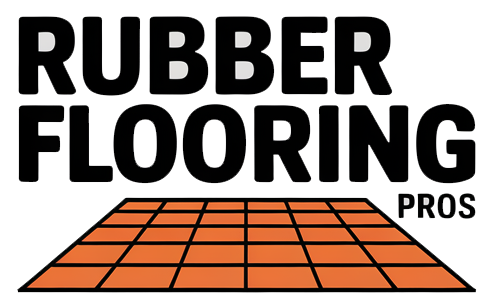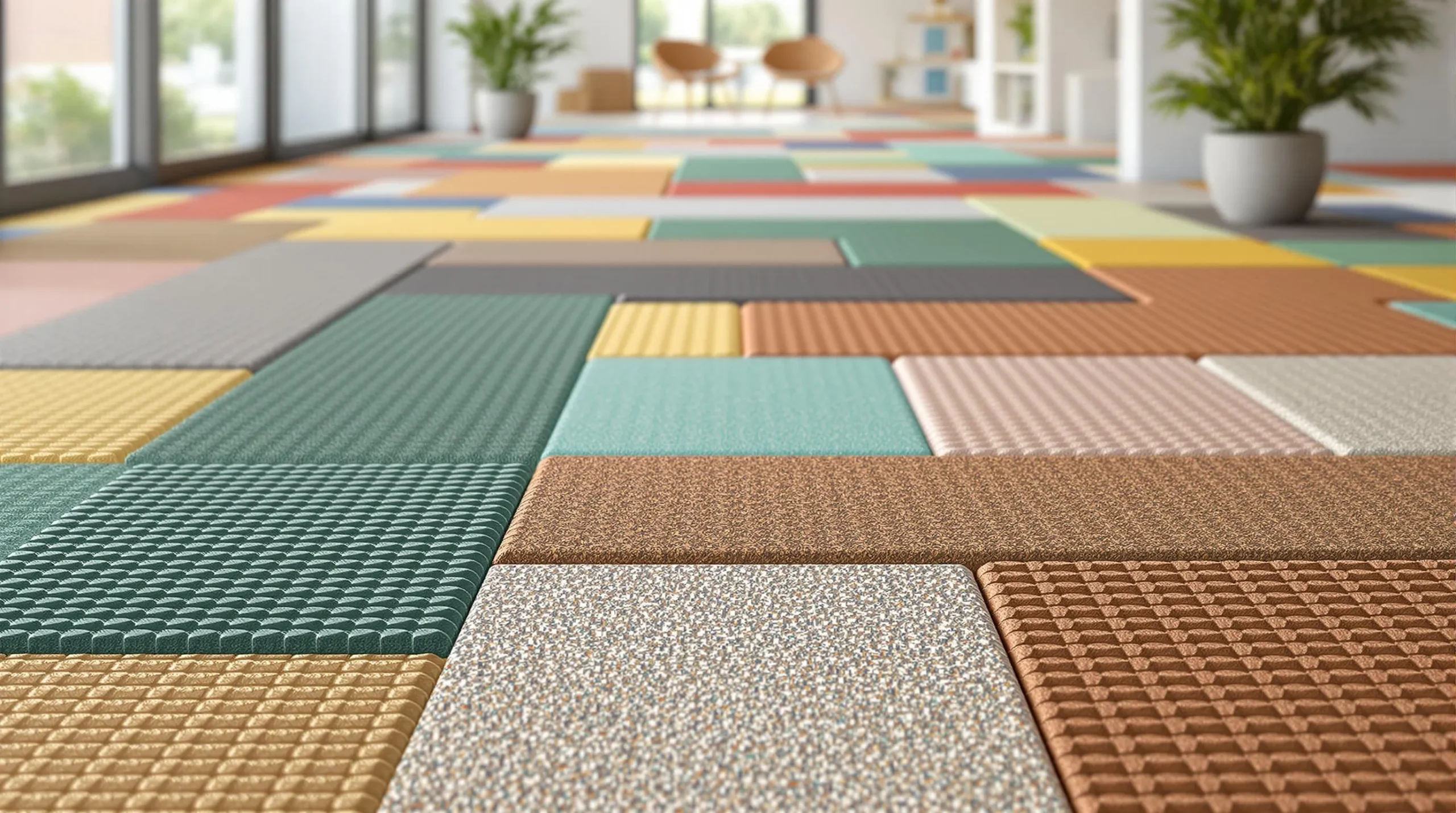Transforming your gym space starts from the ground up and selecting the right flooring isn’t just about aesthetics – it’s about safety performance and longevity. Whether you’re setting up a commercial fitness centre or creating your dream home gym rubber flooring stands out as the go-to choice for serious fitness enthusiasts.
You’ll find that gym rubber flooring offers unmatched durability and shock absorption protecting both your equipment and joints during intense workouts. It’s designed to withstand heavy weights constant foot traffic and the demanding nature of daily exercise routines while maintaining its integrity for years to come.
Key Takeaways
- Gym rubber flooring offers superior impact absorption, reducing injury risks by absorbing up to 85% of force during high-intensity exercises
- The material significantly reduces noise levels by 15-20 decibels compared to concrete surfaces, making it ideal for both commercial gyms and home fitness spaces
- Two main types are available: recycled rubber tiles (8-40mm thick) and virgin rubber rolls (6-12mm thick), each suited for different applications and budgets
- Proper thickness selection is crucial – light exercise needs 5-8mm whilst heavy lifting areas require 20-40mm for optimal performance and protection
- Regular maintenance with pH-neutral cleaners and proper daily cleaning routines can significantly extend the flooring’s 15-20 year lifespan
- Initial investment ranges from £25-£80 per m², but long-term benefits include reduced equipment damage, lower maintenance costs and enhanced safety features
Benefits of Gym Rubber Flooring
Gym rubber flooring delivers essential performance features that create an optimal exercise environment. Its specialized construction provides multiple advantages for both facility owners and gym users.
Impact Absorption and Safety
Rubber gym flooring absorbs up to 85% of impact force during high-intensity exercises. The shock-absorbing properties protect your joints knees ankles from stress during jumping movements burpees box jumps plyometrics. This cushioning effect reduces injury risks while maintaining stability for weightlifting squats deadlifts overhead presses.
Key safety benefits include:
- Prevents equipment damage from dropped weights
- Provides grip resistance to minimize slipping
- Absorbs impact from falls during dynamic movements
- Creates stable foundation for balance exercises
Noise Reduction Properties
Rubber flooring reduces sound transmission by 15-20 decibels compared to concrete surfaces. The dense rubber composition dampens vibrations from:
- Dropping dumbbells barbells weight plates
- Running jumping on cardio equipment
- Group fitness activities high-intensity training
- Weight machine operation cable movements
- Minimises noise transfer between floors
- Reduces echo in large workout spaces
- Decreases disturbance to neighbouring areas
- Enables peaceful environment for yoga meditation classes
| Noise Reduction Comparison | Concrete Floor | Rubber Flooring |
|---|---|---|
| Weight Impact (dB) | 95 | 75 |
| Running Impact (dB) | 85 | 70 |
| Equipment Operation (dB) | 80 | 65 |
Types of Rubber Flooring Materials
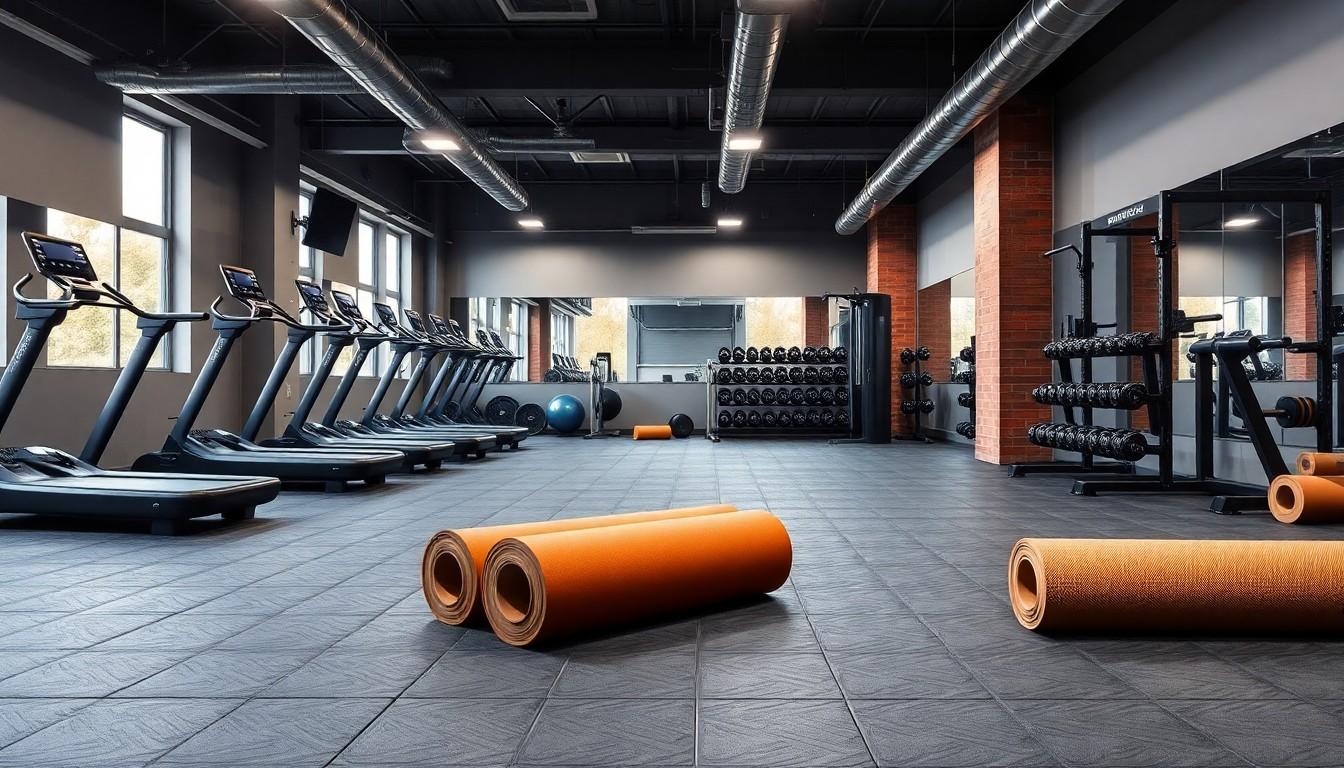
Gym rubber flooring comes in distinct material variations, each offering specific benefits for different fitness environments. The two primary categories include recycled rubber tiles and virgin rubber rolls, providing options to match various facility requirements.
Recycled Rubber Tiles
Recycled rubber tiles transform used vehicle tyres into durable gym flooring materials. These tiles feature:
- Interlocking edges for seamless installation
- Thickness options ranging from 8mm to 40mm
- Cost-effective pricing compared to virgin rubber
- Environmental sustainability through waste reduction
- Enhanced shock absorption from varied rubber densities
Key specifications for recycled rubber tiles:
| Feature | Specification |
|---|---|
| Standard Sizes | 500mm x 500mm, 1000mm x 1000mm |
| Weight Capacity | 200-450 kg/m² |
| Colour Options | Black with colour flecks |
| Warranty | 5-8 years |
Virgin Rubber Rolls
Virgin rubber rolls consist of newly manufactured rubber compounds designed specifically for fitness applications. These rolls deliver:
- Uniform composition throughout the material
- Precise colour matching capabilities
- Superior resistance to cleaning chemicals
- Consistent density for predictable performance
- Smooth surface texture for easy maintenance
| Feature | Specification |
|---|---|
| Standard Widths | 1.2m to 1.8m |
| Roll Length | 10m to 25m |
| Thickness Range | 6mm to 12mm |
| Weight Capacity | 400-600 kg/m² |
| Warranty | 10-15 years |
Key Considerations When Choosing Gym Flooring
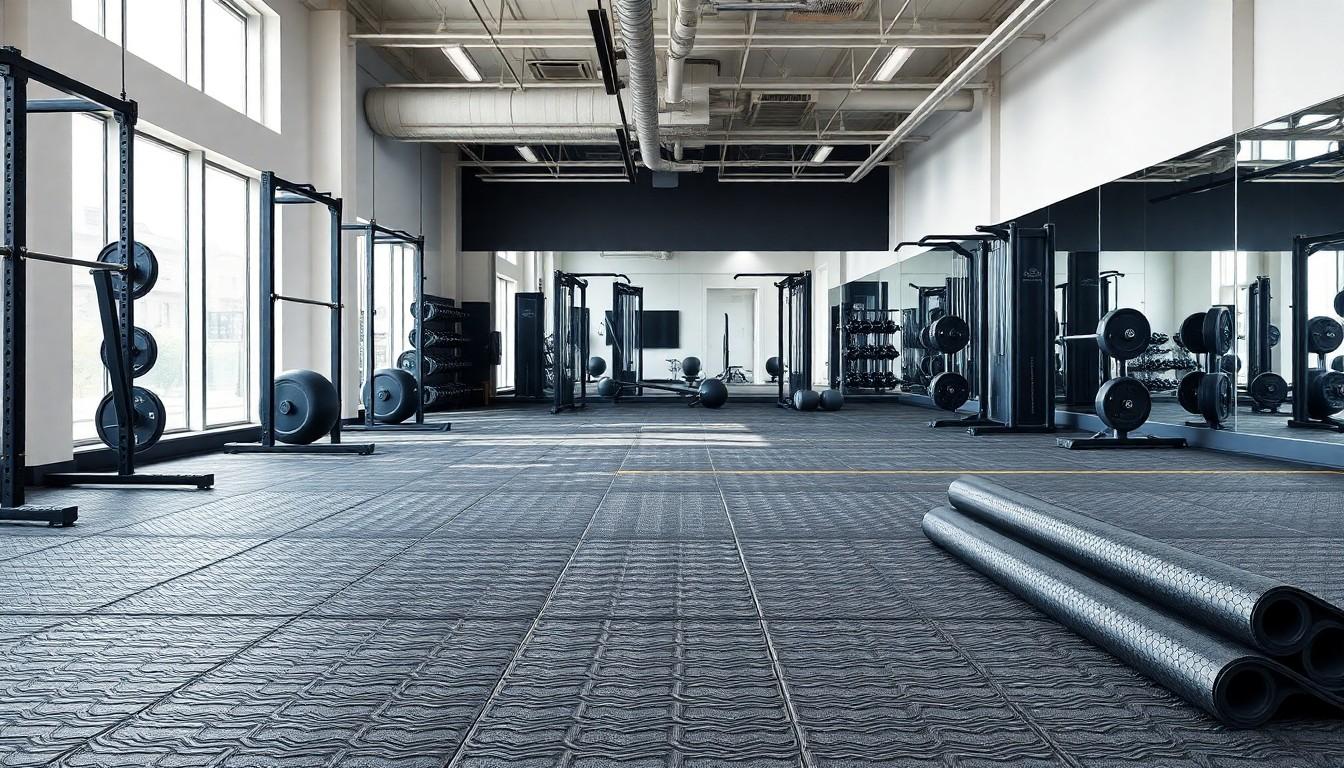
Selecting appropriate gym flooring requires careful evaluation of several technical specifications to ensure optimal performance and longevity. Here’s a detailed analysis of crucial factors to examine during the selection process.
Thickness Requirements
Gym rubber flooring thickness ranges from 5mm to 40mm, with specific applications for different exercise types. A minimum thickness of 8mm supports general fitness activities like yoga or light equipment use. Heavy weightlifting areas demand 15mm to 20mm thickness to absorb impact from dropped weights. CrossFit zones benefit from 20mm to 40mm thickness for enhanced shock absorption during Olympic lifts.
| Activity Type | Recommended Thickness | Weight Capacity |
|---|---|---|
| Light Exercise | 5-8mm | Up to 100kg |
| General Fitness | 8-15mm | Up to 200kg |
| Weight Training | 15-20mm | Up to 350kg |
| Heavy Lifting | 20-40mm | Over 350kg |
Installation Methods
Gym rubber flooring installation varies based on the selected product format:
- Interlocking Tiles
- Click-together edges create seamless connections
- No adhesive required for areas under 50m²
- Allows for quick removal or replacement of damaged sections
- Roll-Out Installation
- Requires permanent adhesive application
- Suits large, open spaces over 100m²
- Creates fewer seams than individual tiles
- Loose-Lay Method
- Ideal for temporary installations
- Uses double-sided tape on perimeter edges
- Works with rolls or tiles under 30m²
- Total project timeline
- Installation costs
- Floor maintenance requirements
- Future modification possibilities
Maintenance and Care Tips
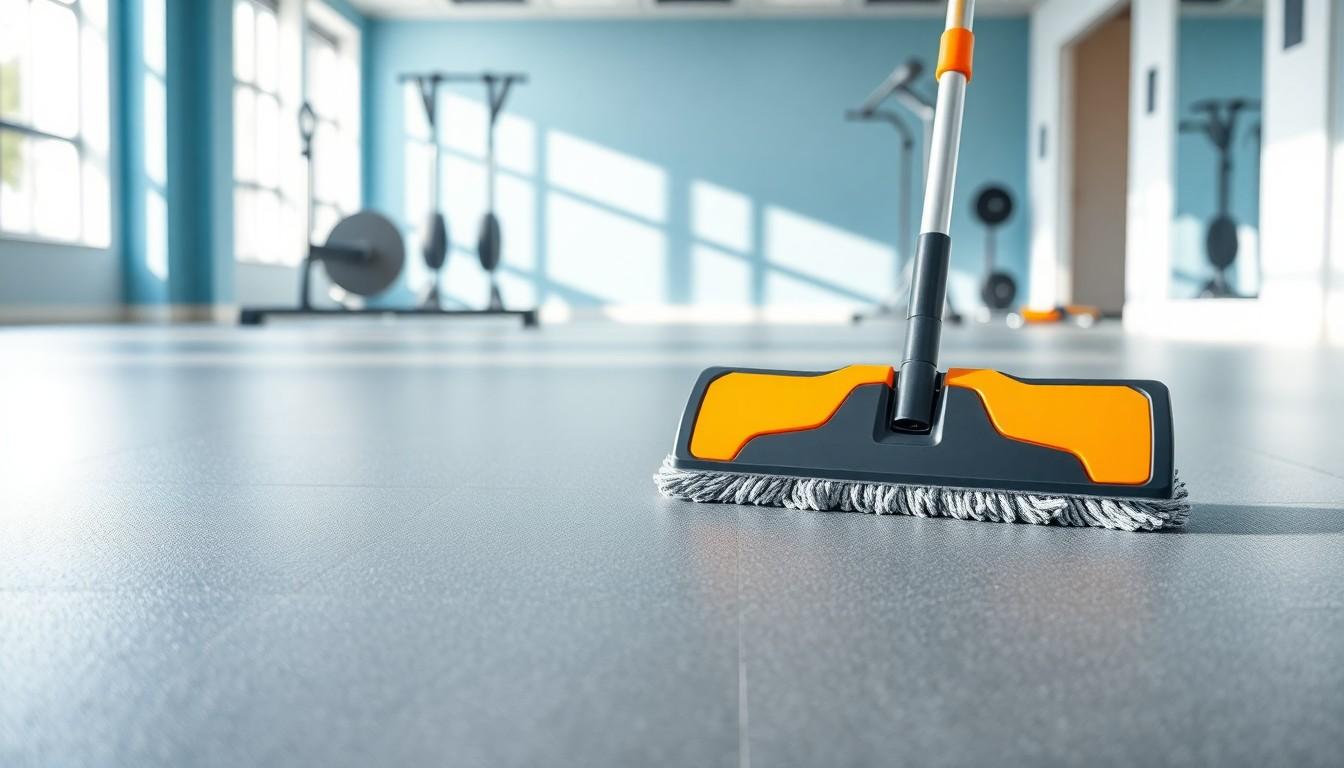
Proper maintenance of gym rubber flooring extends its lifespan and preserves its performance characteristics. Regular cleaning and maintenance protect your investment while ensuring a hygienic exercise environment.
Daily Cleaning Practices
Maintaining gym rubber flooring requires these daily cleaning steps:
- Sweep loose debris with a soft-bristled broom to remove dust particles
- Vacuum high-traffic areas using a machine without beater bars
- Spot clean spills immediately with a damp microfibre mop
- Use a pH-neutral cleaner diluted according to manufacturer specifications
- Remove chalk marks from weightlifting areas with a dry microfibre cloth
- Mop the entire floor surface with clean water after spot treatments
- Ensure proper ventilation to help quick drying
Deep Cleaning Procedures
Deep cleaning gym rubber flooring involves these monthly tasks:
- Scrub the entire surface with an automatic floor scrubber
- Apply manufacturer-approved disinfectant solutions
- Focus on seams between tiles or roll sections
- Remove stubborn stains using specialised rubber floor cleaners
- Extract dirt from textured surfaces with soft-bristled brushes
- Allow 4-6 hours drying time after deep cleaning
- Inspect for damage or loose areas during cleaning process
| Equipment Type | Purpose | Frequency of Use |
|---|---|---|
| Microfibre Mops | Daily cleaning | 1-2 times per day |
| Floor Scrubber | Deep cleaning | Monthly |
| Soft Brushes | Stain removal | As needed |
| pH-neutral Cleaner | Regular maintenance | Daily |
| Disinfectant | Sanitisation | Weekly |
Cost Analysis and Value
Initial Investment
Gym rubber flooring costs vary based on material type thickness:
| Material Type | Price Range (per m²) | Installation Cost (per m²) |
|---|---|---|
| Recycled Rubber Tiles | £25-£45 | £8-£15 |
| Virgin Rubber Rolls | £35-£65 | £12-£20 |
| Premium Rubber Tiles | £50-£80 | £15-£25 |
Long-term Financial Benefits
The durability of rubber gym flooring translates to significant cost savings over time:
- Reduces equipment replacement costs by protecting weights dumbbells bars
- Lowers maintenance expenses with simple cleaning requirements
- Minimises floor repairs compared to concrete vinyl surfaces
- Extends equipment lifespan through shock absorption impact protection
Return on Investment Factors
Several elements contribute to the value proposition of rubber gym flooring:
- Energy cost reduction through improved insulation
- Insurance premium savings due to enhanced safety features
- Increased member retention from superior workout experience
- Extended facility lifecycle with minimal replacement needs
Cost Comparison
| Flooring Type | 10-Year Cost (per m²) | Lifespan (Years) | Annual Maintenance Cost (per m²) |
|---|---|---|---|
| Rubber Flooring | £45-£85 | 15-20 | £2-£4 |
| Vinyl | £35-£55 | 7-10 | £4-£6 |
| Concrete Coating | £25-£40 | 5-7 | £5-£8 |
- Sound dampening properties reduce acoustic treatment costs
- Antimicrobial treatments prevent bacterial growth
- Colour customisation options enhance branding opportunities
- Warranty coverage protects against manufacturing defects
Popular Brands and Manufacturers
Leading manufacturers produce high-quality gym rubber flooring solutions that meet specific performance requirements across different facility types.
Premium Global Brands
Reputable global brands offer comprehensive rubber flooring solutions:
- Regupol produces precision-engineered rubber flooring with acoustic properties
- Pavigym specialises in interactive fitness flooring systems with smart technology integration
- Ecore Athletic delivers performance surfaces for Olympic training facilities
- Tarkett Sports creates customised rubber flooring for professional sports venues
- PLAE develops impact-resistant surfaces for CrossFit boxes
UK-Based Manufacturers
Local British manufacturers provide tailored flooring solutions:
- Jordan Fitness supplies commercial-grade rubber tiles with 5-year warranties
- Gym Flooring UK manufactures recycled rubber rolls in Birmingham
- Physical Company produces custom-thickness rubber mats for free-weight zones
- Origin Fitness designs modular rubber systems for boutique gyms
- Cannons UK specialises in rubber surfaces for school gymnasiums
Product Specifications Comparison
| Brand | Material Type | Thickness Range | Warranty Period | Impact Rating |
|---|---|---|---|---|
| Regupol | Virgin Rubber | 4mm – 40mm | 15 years | 95% absorption |
| Pavigym | Recycled Rubber | 5mm – 22mm | 10 years | 85% absorption |
| Jordan Fitness | Mixed Compound | 8mm – 30mm | 5 years | 80% absorption |
| Ecore Athletic | Virgin Rubber | 6mm – 35mm | 12 years | 90% absorption |
| Physical Company | Recycled Rubber | 10mm – 25mm | 8 years | 82% absorption |
Distribution Networks
Key distribution channels ensure product availability:
- Direct manufacturer sales teams for commercial projects
- Authorised regional dealers with installation services
- Online retail platforms with delivery options
- Specialist fitness equipment suppliers
- Trade-only wholesalers for contractors
- ISO 9001 quality management certification
- EN 14041 safety standards compliance
- Environmental ISO 14001 certification
- Fire safety rating EN 13501-1
- Slip resistance certification EN 13893
Conclusion
Investing in quality gym rubber flooring is a decision that’ll benefit your facility for years to come. It’s not just about creating an attractive exercise space – it’s about building a safe reliable and high-performing environment for your members or personal workouts.
Whether you opt for recycled rubber tiles or virgin rubber rolls the key is choosing a solution that matches your specific needs and budget. Remember to factor in the proper thickness maintenance requirements and installation methods to maximise your investment.
With the right rubber flooring solution you’ll create a gym space that protects both users and equipment while delivering outstanding performance day after day. It’s an investment that truly pays for itself through reduced maintenance costs extended equipment life and enhanced user satisfaction.
Frequently Asked Questions
What thickness of rubber flooring is recommended for a gym?
The recommended thickness varies by activity type. For general fitness, 8mm is sufficient. Heavy weightlifting areas need 15-20mm thickness, whilst CrossFit zones require 20-40mm. Choose thickness based on your primary workout activities and equipment weight.
Is rubber flooring suitable for home gyms?
Yes, rubber flooring is ideal for home gyms. It protects your subfloor, reduces noise transmission, provides excellent shock absorption, and is durable enough to withstand heavy equipment. It’s available in various formats suitable for DIY installation.
How do I clean and maintain gym rubber flooring?
Daily maintenance includes sweeping and vacuuming, with spot cleaning using pH-neutral cleaners. Perform monthly deep cleaning using an automatic floor scrubber and disinfectant solutions. Avoid harsh chemicals that could damage the rubber surface.
What’s the difference between recycled and virgin rubber flooring?
Recycled rubber flooring is made from used vehicle tyres and features interlocking edges, whilst virgin rubber rolls are manufactured from new rubber compounds. Virgin rubber offers more uniform composition and better chemical resistance, but recycled options are more cost-effective.
How long does gym rubber flooring last?
With proper maintenance, gym rubber flooring can last 10-15 years or more. The lifespan depends on usage intensity, maintenance routine, and initial quality. Premium products typically come with warranties ranging from 5-10 years.
Is rubber flooring cost-effective for gyms?
Yes, despite higher initial costs, rubber flooring proves cost-effective long-term. It reduces equipment replacement costs, requires minimal maintenance, and offers energy savings. The durability and protective qualities make it a worthwhile investment for any gym facility.
Can rubber flooring help reduce noise in my gym?
Absolutely. Rubber flooring significantly dampens vibrations and reduces noise from dropped weights, cardio equipment, and general exercise activities. This makes it ideal for multi-storey buildings and areas requiring noise control.
Which brands are recommended for gym rubber flooring?
Leading brands include Regupol, Pavigym, Ecore Athletic, and Jordan Fitness. These manufacturers offer high-quality products meeting safety and performance standards. Choose based on your specific needs and budget requirements.
